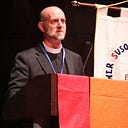Member-only story
Despair and Hope at Odds
I like to think of myself as someone who understands politics. Or at least I thought I did. I have a long history with politics — from it being all consuming (that wasn’t healthy), to hating it (not healthy either), to making some sort of peace with it, to trying to ignore it, to being concerned about the people in it. It seems that for many people politics has taken the place that religion once had in their lives. Religion offers a sense of identity, meaning, purpose. There are origin stories and sacredness. There is a call to follow. There are things that are taught and learned. There are ways to see people. There are sins and blessings.
But for several years now so much of these very things seems to be played out in the realm of politics — usually not in a healthy way.
I’m also a student of history. And because of that, I also recognize that what I’m observing isn’t anything new. Politics has used and abused religion probably more often than not. Religion and politics are more alike than we often like to admit. I’m fond of saying that religion and politics are really the same thing — a study of people and a presentation of a possible future, grounded in identity, belonging, and meaning making. This seems to be just another time in history in which politics is using religion’s core for its own purposes. I don’t mean that in terms of institutions either. I’m talking about something much deeper — power, control, ideas, etc. Religion is unhealthy and destructive when its primary concerns are about order and control and power.
In conversations with people recently, I’ve realized something. There seems to be an air of despair or inevitability. A type of ominous hopelessness in the air. As if anything that we do to try to change anything is pointless. It seems like no one is willing to listen, so why bother saying anything. It seems like no one is open to considering an alternative, so why bother presenting one. It seems like certain results are going to happen, so why bother paying attention.
This is different than the idea that people don’t like change. Regardless, I think that idea is false. People don’t like to feel like they aren’t in charge or control of the change. They willingly change in a heartbeat if they can control it and see benefit to it.
I don’t know if all of this goes together or not — the idea of the human desire to be in control, while feeling despair for not being in control. I’m sure there is a better way to say it, but that’s…
